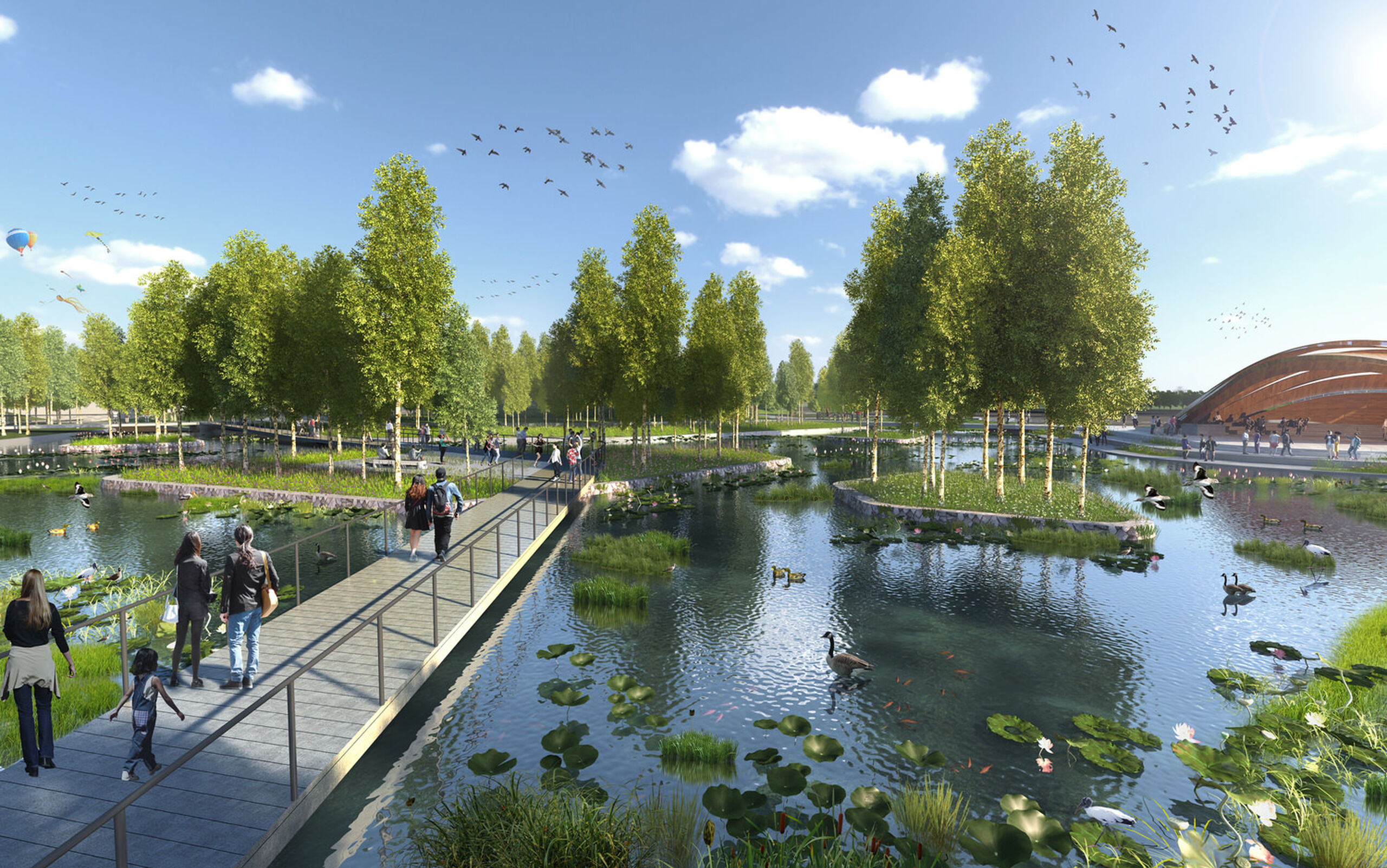

26th Nov 2018
Grant Associates presents at 2018 China-Singapore International Green Building Forum
Stefaan Lambreghts, senior associate at Grant Associates, was among a line-up of industry experts to present at the 2018 China-Singapore International Green Building Forum held at Sino-Singapore Tianjin Eco-City in northern China.
The conference explored the theme ‘From Green Buildings to Green Cities’ and was timed to coincide with the 10th anniversary of Tianjin Eco-City – China’s first green development demonstration zone.
The bilateral cooperation project between Singapore and China began in 2008 with the aim of regenerating a 30 sq km area of polluted wasteland in Tianjin. A key part of the design vision was to create a model ‘Sponge City’ featuring designs to passively absorb, clean and manage rainfall in an ecologically friendly way.
Stefaan Lambreghts spoke about the landscape opportunities for people and nature created by Sponge City interventions. He drew on Grant Associates’ extensive experience in this area, including Singapore’s internationally acclaimed Gardens by the Bay and Sino Singapore Friendship Park - a 41 hectare city park currently being built at Tianjin Eco-City.
During the event, Singapore’s Minister for Development Lawrence Wong and China’s Vice Minister of Housing and Urban-Rural Development Huang Yan officially unveiled a plaque showing Grant Associates’ design for Sino-Singapore Friendship Park. Limited areas of the park are now accessible, and the project is expected to finish by the end of next year.
Stefaan Lambreghts comments: “Tianjin Eco-City is leading the way for the design and construction of sustainable Chinese cities based on Sponge City principles. In recent years, a lot of technical expertise has been gained in the managing of water quantity and quality in China, particularly in Tianjin Eco-City.
“As Sponge City principles become mainstream, attention will shift from more quantitative technological models to more imaginative models in which the impact of water on nature and the experiential opportunities for people take centre stage.
“The Sino-Singapore Friendship Park is an example of this approach with its innovative environmental design and Sponge City strategy. The park takes pride of place at the heart of Tianjin Eco-City.
“It was a pleasure to address the forum and discuss the creative ways in which Sponge City design principles could help shape the world’s future cities for the better, especially on the occasion of Tianjin Eco-City’s 10th anniversary.”
The conference explored the theme ‘From Green Buildings to Green Cities’ and was timed to coincide with the 10th anniversary of Tianjin Eco-City – China’s first green development demonstration zone.
The bilateral cooperation project between Singapore and China began in 2008 with the aim of regenerating a 30 sq km area of polluted wasteland in Tianjin. A key part of the design vision was to create a model ‘Sponge City’ featuring designs to passively absorb, clean and manage rainfall in an ecologically friendly way.
Stefaan Lambreghts spoke about the landscape opportunities for people and nature created by Sponge City interventions. He drew on Grant Associates’ extensive experience in this area, including Singapore’s internationally acclaimed Gardens by the Bay and Sino Singapore Friendship Park - a 41 hectare city park currently being built at Tianjin Eco-City.
During the event, Singapore’s Minister for Development Lawrence Wong and China’s Vice Minister of Housing and Urban-Rural Development Huang Yan officially unveiled a plaque showing Grant Associates’ design for Sino-Singapore Friendship Park. Limited areas of the park are now accessible, and the project is expected to finish by the end of next year.
Stefaan Lambreghts comments: “Tianjin Eco-City is leading the way for the design and construction of sustainable Chinese cities based on Sponge City principles. In recent years, a lot of technical expertise has been gained in the managing of water quantity and quality in China, particularly in Tianjin Eco-City.
“As Sponge City principles become mainstream, attention will shift from more quantitative technological models to more imaginative models in which the impact of water on nature and the experiential opportunities for people take centre stage.
“The Sino-Singapore Friendship Park is an example of this approach with its innovative environmental design and Sponge City strategy. The park takes pride of place at the heart of Tianjin Eco-City.
“It was a pleasure to address the forum and discuss the creative ways in which Sponge City design principles could help shape the world’s future cities for the better, especially on the occasion of Tianjin Eco-City’s 10th anniversary.”